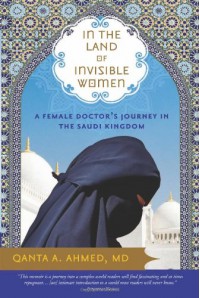136
Followers
112
Following
Kaia
Feminist Killjoy. Badly Behaving Bookliker. Writer and reader of all things speculative.
Currently reading
The Unbecoming of Mara Dyer
Diablo III: Storm of Light
Progress:
133/341 pages
Neuromancer
A Taste of Blood Wine
Progress:
380/501 pages
Ancillary Justice
The Enemy (The Enemy #1)
The Night Circus
Perdition
 Despite my efforts, I know I won't finish this book. And that's too bad, because I got it for research purposes. But nearly half the book yielded less than a page and a half of notes, and the writing is terrible. I hate to say that, because I know this is Ahmed's personal journey here, but god, the purple prose and amateur writing mistakes make it impossible to continue this.I'm not kidding when I say purple prose, either. I never thought I'd use the word 'turgid' in all seriousness, but it honestly fits. Normally I'm not good at remembering specific instances of prose, but here is an example so egregious, it stuck with me:In one hand the Muttawa carried a cane, to wield his corpulence along the causeway as he heaved along the tightrope of extremism.If you like that sort of thing, you might not have a problem with the writing. A quote like that makes me wince, and I'm still not positive what she's trying to say. There's a lot of instances of this sort of writing, or writing that is pretty simply for the sake of being pretty. None of it feels like the genuine observations someone might make about what they're seeing and feeling. This is a memoir, but at times it doesn't feel at all like a person's actual experiences.Amateur mistakes abound, too. The book is heavy on redundancy, with Ahmed at times repeating basically the same thing in subsequent sentences, only worded differently. We're told numerous times in a short amount of pages that Muslims must worship only Allah, not inanimate things or idols and really, when I'm reading a book, I don't want to feel like the author thinks my short-term memory only lasts maybe a thousand words. There's also a tendency for her to basically reintroduce the people she's recounting; that is, she'll talk about them as if each time is the first time she's mentioning them. This is overbearing, and during her recounting of the Hajj, it's also unbearable. I understand this is something of great importance to her, but it's hard to get caught up in her religious fervor with the redundancies and her tendency towards minutely detailed, eggplant-shaded asides about things like the people doing the cleaning. If you're so enraptured by Allah that the world disappears, why would you notice some peeps with their brooms? There's a number of things like this, that feel like they were inserted later on and have nothing to do with Ahmed's feelings and experiences at the time. In fact, she loves asides. She places an entire chapter on Bedouin women right smack in the middle of the Hajj, just to point out how nice they are, and likes to write about what's happening in the present and how it differs from what was going on then. The latter is often interesting, but has a tendency to throw the reader (*waves*) right out of the emotions of the story. There's also a quality to the writing, especially the dialog, that is...hard for me to define. In the dialog at times people will call other people (especially Qanta) by their name over and over and over again. Now, maybe this is the way Saudi Arabian people talk; I really don't know. But even if it's true to life, it makes for awkward reading. Beyond that, there's a simplistic tone to it that often makes the people, especially Ahmed, come off sounding...less than bright. I hate to say that, because clearly she's an intelligent woman, but some of the dialog and emotional reactions feel like they were written by a child. A somewhat slow child. Finally, she does an awful lot of this:Feeling for my glasses, an anxious face came into view.If you can't quite tell why this is so bad, I'll give you a hint: The person the anxious face belongs to is not the one reaching for Ahmed's glasses. You just don't do that sort of thing in writing. This is, unfortunately, really a book that needed some serious TLC from a red pen. That might be harsh, but the writing does Ahmed's experiences no justice.
Despite my efforts, I know I won't finish this book. And that's too bad, because I got it for research purposes. But nearly half the book yielded less than a page and a half of notes, and the writing is terrible. I hate to say that, because I know this is Ahmed's personal journey here, but god, the purple prose and amateur writing mistakes make it impossible to continue this.I'm not kidding when I say purple prose, either. I never thought I'd use the word 'turgid' in all seriousness, but it honestly fits. Normally I'm not good at remembering specific instances of prose, but here is an example so egregious, it stuck with me:In one hand the Muttawa carried a cane, to wield his corpulence along the causeway as he heaved along the tightrope of extremism.If you like that sort of thing, you might not have a problem with the writing. A quote like that makes me wince, and I'm still not positive what she's trying to say. There's a lot of instances of this sort of writing, or writing that is pretty simply for the sake of being pretty. None of it feels like the genuine observations someone might make about what they're seeing and feeling. This is a memoir, but at times it doesn't feel at all like a person's actual experiences.Amateur mistakes abound, too. The book is heavy on redundancy, with Ahmed at times repeating basically the same thing in subsequent sentences, only worded differently. We're told numerous times in a short amount of pages that Muslims must worship only Allah, not inanimate things or idols and really, when I'm reading a book, I don't want to feel like the author thinks my short-term memory only lasts maybe a thousand words. There's also a tendency for her to basically reintroduce the people she's recounting; that is, she'll talk about them as if each time is the first time she's mentioning them. This is overbearing, and during her recounting of the Hajj, it's also unbearable. I understand this is something of great importance to her, but it's hard to get caught up in her religious fervor with the redundancies and her tendency towards minutely detailed, eggplant-shaded asides about things like the people doing the cleaning. If you're so enraptured by Allah that the world disappears, why would you notice some peeps with their brooms? There's a number of things like this, that feel like they were inserted later on and have nothing to do with Ahmed's feelings and experiences at the time. In fact, she loves asides. She places an entire chapter on Bedouin women right smack in the middle of the Hajj, just to point out how nice they are, and likes to write about what's happening in the present and how it differs from what was going on then. The latter is often interesting, but has a tendency to throw the reader (*waves*) right out of the emotions of the story. There's also a quality to the writing, especially the dialog, that is...hard for me to define. In the dialog at times people will call other people (especially Qanta) by their name over and over and over again. Now, maybe this is the way Saudi Arabian people talk; I really don't know. But even if it's true to life, it makes for awkward reading. Beyond that, there's a simplistic tone to it that often makes the people, especially Ahmed, come off sounding...less than bright. I hate to say that, because clearly she's an intelligent woman, but some of the dialog and emotional reactions feel like they were written by a child. A somewhat slow child. Finally, she does an awful lot of this:Feeling for my glasses, an anxious face came into view.If you can't quite tell why this is so bad, I'll give you a hint: The person the anxious face belongs to is not the one reaching for Ahmed's glasses. You just don't do that sort of thing in writing. This is, unfortunately, really a book that needed some serious TLC from a red pen. That might be harsh, but the writing does Ahmed's experiences no justice.










